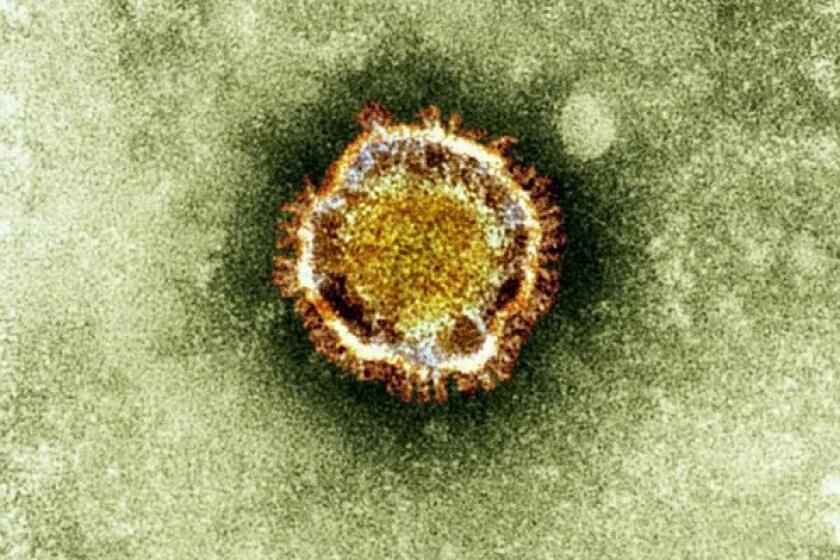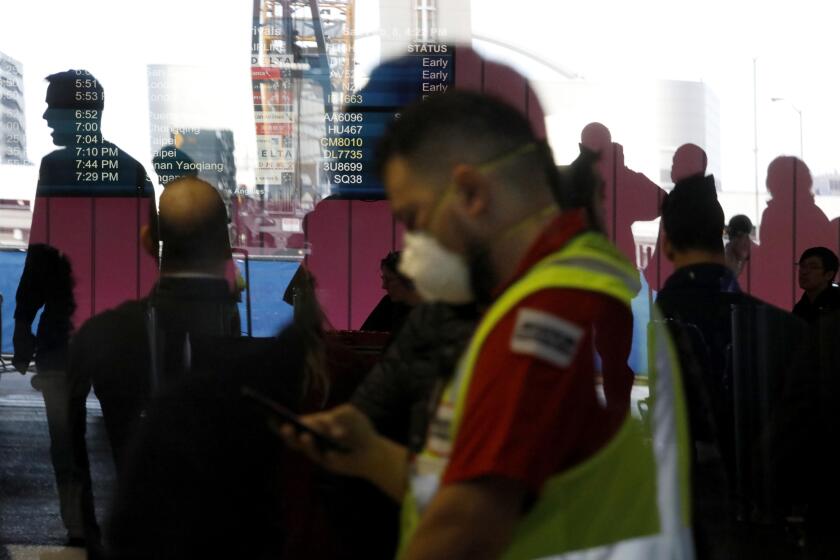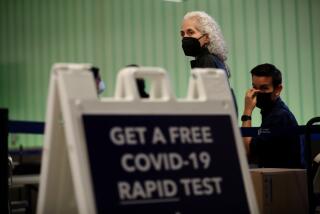Ugly battles erupt as residents fight housing coronavirus patients in their cities
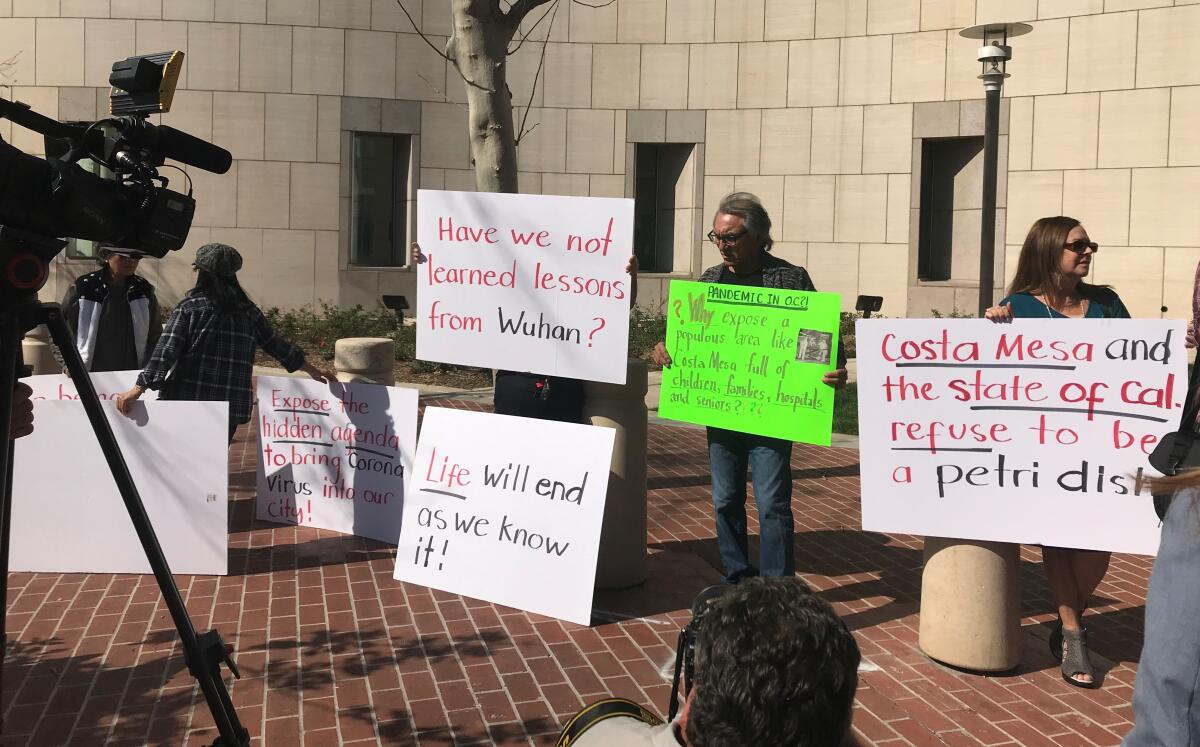
- Share via
The coronavirus has yet to become a major health threat in Orange County. But a proposal to eventually place some patients at a state-owned facility in Costa Mesa has sparked a political battle in which wary residents are speaking in conspiratorial, even apocalyptic terms.
“Expose the hidden agenda to bring coronavirus into our city,” one wrote on a poster board outside a federal courthouse in Santa Ana on Monday.
“Life will end as we know it,” added another.
At the focus of their fury is a proposal to use the Fairview Developmental Center as a coronavirus quarantine site, a notion that drew swift and fierce condemnation from city, county, state and federal officials representing the area.
It’s likely only the first round in a brewing battle — one pitting higher-level health officials working to stem the spread of the coronavirus known as COVID-19 against the communities expected to play host to those efforts. Officials in Alabama have also been fighting efforts to locate patients in that state, and there even has been rumbling of opposition from people living by quarantine zones near military bases.
The city of Costa Mesa is fighting the federal government’s efforts to locate a coronavirus quarantine at the city’s Fairview Developmental Center.
But as the number of confirmed cases rockets past 80,000 worldwide, and U.S. health officials warn the disease will inevitably spread stateside at some point, public health experts warn that contending with the fallout from the epidemic’s indirect symptoms — fear, paranoia and misinformation chief among them — may prove just as vital as treating the sickness itself.
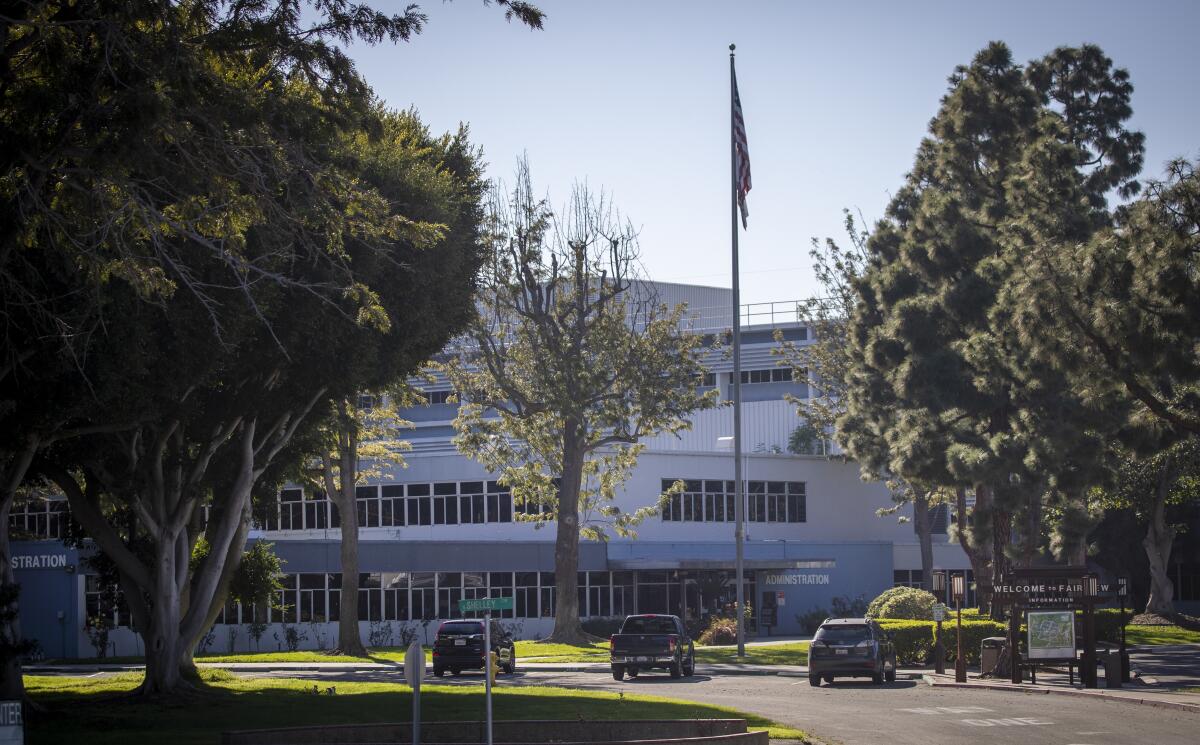
“You’re dealing with fear, discrimination and stigma, and that can be much harder to contain and control and move against than the actual virus,” said Dr. Timothy Brewer, a professor of epidemiology at the UCLA Fielding School of Public Health and of medicine at the university’s David Geffen School of Medicine. “And that’s the big challenge, because that’s not necessarily a discussion you can win with facts and being rational.”
On Tuesday, the Centers for Disease Control and Prevention offered its most serious warning to date that the United States should expect the coronavirus to become a more serious health issue and that it was time to prepare for it.
“Ultimately, we expect we will see coronavirus spread in this country,” said Nancy Messonnier, director of the CDC’s National Center for Immunization and Respiratory Diseases. “It’s not so much a question of if, but a question of when.”
Stock prices dropped sharply Tuesday for the second consecutive day as investors grew increasingly skeptical that the virus would soon be contained and worried about how much it would damage the global economy.
The Centers for Disease Control and Prevention has advised communities to take precautions in the event that the coronavirus spreads.
One element of the response is using sites like Fairview to house patients. The 114-acre property once housed thousands of adults with intellectual and developmental disabilities but is now largely empty as the state plans to close the facility.
It’s unclear how many sites are under similar consideration. The California Health and Human Services Agency has confirmed it considered several other possibilities, including the Sonoma Developmental Center, Army National Guard Camp Roberts and closed youth correctional facilities.
“Safely and securely isolating our fellow Californians who are under federal care is an important way to keep all of our communities safe from novel coronavirus, and we will continue to communicate with local partners — both those in Costa Mesa and communities that are being greatly impacted by shortages of hospital isolation beds,” the agency said in a statement.
The Centers for Disease Control and Prevention says it is monitoring anyone who has traveled through Hubei province in China, the epicenter of the coronavirus outbreak.
Regardless, Costa Mesa officials are adamant that Fairview is not a suitable location — citing concerns with public health and a lack of specifics about the proposal. The city has successfully obtained a temporary restraining order to halt the transportation of anyone infected with the coronavirus to the city.
“While we have nothing but compassion for those who are suffering from this virus, the health and welfare of our community is our top priority,” Mayor Katrina Foley said Monday. “Bringing those infected into this densely populated area is simply the wrong approach.”
The Orange County Board of Supervisors voted unanimously Tuesday to file an amicus brief in support of Costa Mesa’s legal fight.
The board “stands together to support public health and safety in our community,” Chairwoman Michelle Steel said in a statement. “We have not been provided adequate information or input from the state of California or the U.S. Department of Health and Human Services regarding their proposed transfer of COVID-19 positive patients to Orange County. Our densely populated county is not the right place to bring coronavirus patients.”
A similar situation unfolded recently in Alabama, where local and state officials pushed hard against a proposal to potentially locate patients within the city of Anniston.
U.S. Sen. Richard Shelby (R-Ala.) said Sunday that he had spoken with President Trump and received assurances that plan was off the table.
Costa Mesa, though, has received no such guarantee — leading some to lob accusations of political favoritism.
“California must not have the pull to get taken off the list,” Jennifer Keller, the city’s attorney, said during a court hearing Monday. “Alabama does.”
Daniel Beck, an attorney for the federal government, said Fairview was “determined to be a superior site,” because the facility has individual rooms with bathrooms attached, which would facilitate isolation and allow several patients to be monitored in a small area.
Of the patients who remain at Travis Air Force Base and hospitals in Northern California, about 10 “units” of people who have tested positive for COVID-19 but do not have symptoms could be isolated at Fairview, Beck added. A unit could be an individual or a family.
While attempting to quell the warring sides, presiding U.S. District Judge Josephine Staton expressed empathy for the patients whose future is hanging in the balance.
“These are American citizens who have been unfortunately ... and unfairly inflicted with this virus,” she said. “No one should say, ‘Not in my backyard,’ as a general rule.”
Communities are dealing with the threat in different ways. San Francisco Mayor London Breed on Tuesday declared a local emergency, even though there have been no confirmed cases.
“We see the virus spreading in new parts of the world every day, and we are taking the necessary steps to protect San Franciscans from harm,” she said.
Experts said officials face a difficult balancing act of preparing for the virus while tamping down unfounded fears in the public.
“Fear is part of a survival instinct, so when people are faced with a novel disease like COVID-19, they’re trying to answer basic questions for themselves: ‘Where did the disease come from? How is it spreading? Am I at risk? Is my family at risk?’” said Monica Schoch-Spana, a senior scholar at the Johns Hopkins Center for Health Security. “Because diseases like COVID-19 are very unfamiliar, what people do is distinguish between ‘us’ and ‘them.’”
That phenomenon played out earlier this month, when workers at March Air Reserve Base in Riverside County, as well as their families, reported being verbally attacked by people afraid of their proximity to those under quarantine at the base.
“One of the big challenges, whenever you have an outbreak with a new pathogen, is dealing with the fear and the misinformation,” Brewer said. “So right now you have people who are all up in arms in Orange County about a virus that has caused [57] cases — documented cases that we’re aware of — in the United States, and no deaths. At the same time, we’ve had probably 26 million cases of influenza, probably about 14,000 deaths in the United States alone, and I guarantee you that a lot of people who are upset in Orange County have not gotten their flu vaccines. And that’s the disconnect we have.”
During an interview Tuesday, Brewer occasionally had to stop and cough. He’s been under the weather, he said, dealing with an ailment that’s not COVID-19.
“People are very worried about this virus, but they forget about all the other viruses that move around,” he said.
Times Community News staff writer Faith E. Pinho and Times staff writer Colleen Shalby contributed to this report.
More to Read
Sign up for Essential California
The most important California stories and recommendations in your inbox every morning.
You may occasionally receive promotional content from the Los Angeles Times.

